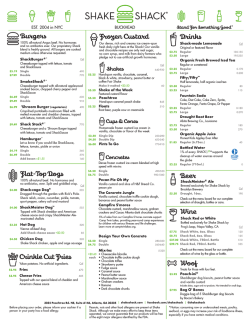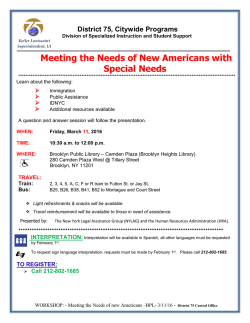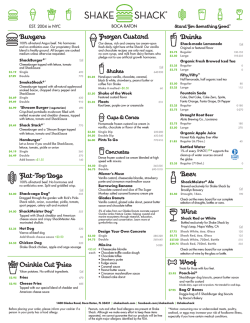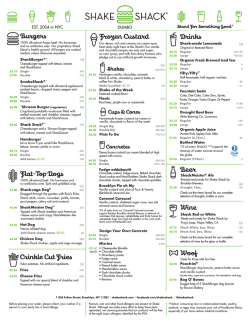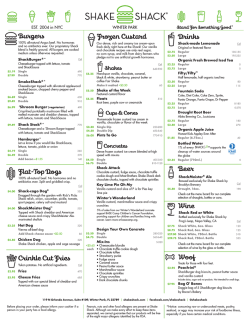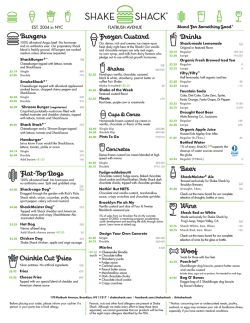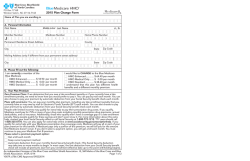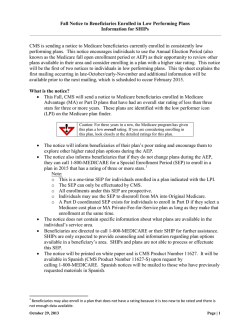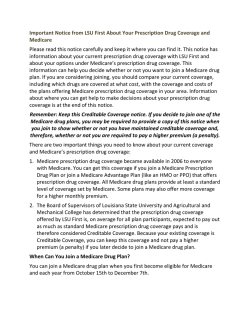
NYT Front Page - The New York Times
CMYK Nxxx,2015-01-30,A,001,Bs-BK,E2 Late Edition Today, cloudy, occasional snow and flurries early, coating to an inch or two, windy, high 37. Tonight, colder, low 12. Tomorrow, brisk, high 24. Weather map appears on Page B10. VOL. CLXIV . . . No. 56,762 $2.50 NEW YORK, FRIDAY, JANUARY 30, 2015 © 2015 The New York Times MEDICARE BILLS RISE FOR STENTS PUT INTO LIMBS China Further Tightens Grip On the Internet Loss of Access Is Called an Economic Threat UNPROVED MEDICAL NEED In-Office Treatment Is Questioned by U.S. and Many Doctors By ANDREW JACOBS BEIJING — Jing Yuechen, the founder of an Internet start-up here in the Chinese capital, has no interest in overthrowing the Communist Party. But these days she finds herself cursing the nation’s smothering cyberpolice as she tries — and fails — to browse photo-sharing websites like Flickr and struggles to stay in touch with the Facebook friends she has made during trips to France, India and Singapore. Gmail has become almost impossible to use here, and in recent weeks the authorities have gummed up Astrill, the software Ms. Jing and countless others depended on to circumvent the Internet restrictions that Western security analysts refer to as the Great Firewall. By interfering with Astrill and several other popular virtual private networks, or V.P.N.s, the government has complicated the lives of Chinese astronomers seeking the latest scientific data from abroad, graphic designers shopping for clip art on Shutterstock and students submitting online applications to American universities. “If it was legal to protest and throw rotten eggs on the street, I’d definitely be up for that,” Ms. Jing, 25, said. China has long had some of the world’s most onerous Internet restrictions. But until now, the authorities had effectively tolerated the proliferation of V.P.N.s as a lifeline for millions of people, from archaeologists to foreign investors, who rely heavily on lessfettered access to the Internet. But earlier this week, after a number of V.P.N. companies, including StrongVPN and Golden Frog, complained that the ChiContinued on Page A6 By JULIE CRESWELL and REED ABELSON MERIDITH KOHUT FOR THE NEW YORK TIMES Thousands waited last week to buy basic goods at subsidized prices in Caracas. Those who cheat on rationing risk arrest. Oil Cash Waning, Venezuelan Shelves Lie Bare Drones Spotted But Not Halted Raise Concerns By WILLIAM NEUMAN CARACAS, Venezuela — Mary Noriega heard there would be chicken. She hated being herded “like cattle,” she said, standing for hours in a line of more than 1,500 people hoping to buy food, as soldiers with side arms checked identification cards to make sure no one tried to buy basic items more than once or twice a week. But Ms. Noriega, a laboratory assistant with three children, said she had no choice, ticking off the inventory in her depleted refrigerator: coffee and corn flour. Things had gotten so bad, she said, that she had begun bartering with neighbors to put food on the table. “We always knew that this BY THE BARREL Running Out of Basics year would start badly, but I think this is super bad,” Ms. Noriega said. Venezuelans have put up with shortages and long lines for years. But as the price of oil, the country’s main export, has plunged, the situation has grown so dire that the government has sent troops to patrol huge lines snaking for blocks. Some states have barred people from waiting outside stores overnight, and government officials are posted near entrances, ready to arrest shoppers who cheat the rationing system. Because Venezuela is so de- pendent on oil sales to buy imports of food, medicine and many other basics, the drop in oil prices means that there is even less hard currency to buy what the country needs. Even before oil prices tumbled, Venezuela was in the throes of a deep recession, with one of the world’s highest inflation rates and chronic shortages of basic items. One of the nation’s most prestigious public hospitals shut down its heart surgery unit for weeks Continued on Page A12 Black Gold, Red Ink The big drop in the price of oil means big quarterly losses for America’s oil giants. Page B1. In Lotteries for New York Housing, Long Odds Grow Ever Longer By MIREYA NAVARRO Sitting in the back pew of a packed church in Fort Greene, Brooklyn, William Jamieson hoped to learn winning tips from a workshop on how to play New York City’s housing lotteries. The lotteries, which the city uses to distribute subsidized apartments in new buildings, can be hard to navigate, and Mr. Jamieson had applications pending for lotteries in two buildings. But surrounded by hundreds of other hopefuls at the church, he was not feeling particularly lucky. “I probably have a better chance playing the Lotto,” said Mr. Jamieson, 46, a warehouse worker who rents a room in a sixbedroom house and was hunting for a studio or a one-bedroom. The odds of winning the New York Lotto jackpot are, of course, worse (one in 22 million on a $1 play), but the housing lotteries have daunting odds of their own. Last year, a new building in Greenpoint, Brooklyn drew 58,832 lottery applications for 105 affordable units. Not far behind was the Sugar Hill development in Upper Manhattan, which drew more than 48,000 applicants for 98 apartments. By MICHAEL S. SCHMIDT and MICHAEL D. SHEAR WASHINGTON — As Major League Baseball’s top players took the field at the All-Star Game in Minneapolis in July, a covert radar system scanned the sky above the 40,000-seat stadium for what security experts said was an emerging threat to public safety: drones. Using finely tuned detection programs brought in by the Department of Homeland Security, “Operation Foul Ball,” as it was known, identified several small, commercial drones flying in the area. Some were similar to the quadcopter that crashed on the White House lawn Monday. But the drone detection system, which was considered one of the most advanced in the country and cost several hundred thousand dollars to operate for just that night, had no way of actually Continued on Page A19 At a time of increasing scrutiny of procedures to open blocked heart arteries, cardiologists are turning to — and reaping huge payments from — controversial techniques that relieve blockages in the arms and legs. Unlike heart procedures, which must be done in a hospital or outpatient facility, where oversight is typically more intense, the opening of the peripheral arteries and veins of the arms and legs can be done in a doctor’s office. Medical experts are questioning the necessity of some of these treatments, and many believe the condition is more safely treated with drugs and exercise. Nonetheless, some of the nation’s most highly reimbursed cardiologists are making millions of dollars from Medicare for performing these procedures, as payments for relieving blockages in the heart have fallen. The Justice Department said it joined two whistle-blower lawsuits accusing one of these doctors of performing unnecessary procedures, including placing a stent in the leg of a patient who later died of complications. The cardiologist in question, Dr. Asad Qamar of Ocala, Fla., was paid $18 million by Medicare in 2012, making him the top-billing cardiologist in the country, according to an analysis by The New York Times of Medicare data. Dr. Qamar was also the leader in billing for procedures to treat peripheral blockages. Nationwide, the shift in doctors’ emphasis is significant. The number of procedures to open blockages in heart vessels fell by about 30 percent from 2005 to 2013, to 323,000 for patients covered under Medicare. Over the same time, the number of similar Continued on Page B2 Shake Shack, Born in a Park, Goes Public With Big Dreams By MICHAEL J. de la MERCED and KIM SEVERSON VICTOR J. BLUE FOR THE NEW YORK TIMES Oluwashina Alaka, with his friend Onicka Oxford, at the Brooklyn apartment he got in a lottery. And topping both was the drawing this month for 38 units at 59 Frost Street in Williamsburg. With rents ranging from $640 for a studio to $1,395 for a two-bedroom, the Brooklyn property attracted more than 80,000 applications, said Martin Dunn, whose Dunn Development Corporation built the project. That is one unit for every 2,110 applications. “It really shows how desperate the need is for affordable housing,” Mr. Dunn said. As the city tries to address a housing crisis, many New York- ers are becoming all too familiar with the lotteries used to dole out apartments that poor and working-class residents can afford. Even as such lotteries proliferate in pockets of the city where new mixed-income developments Continued on Page A23 NATIONAL A13-19 INTERNATIONAL A4-12 BUSINESS DAY B1-10 College Tries to Curb Drinking Deadly Bombings in Sinai Battle Line for Online Privacy Philip J. Hanlon, the president of Dartmouth College, announced that hard liquor would be banned as part of an overhaul of campus life. He has warned of the damage done to the college and its reputation by alcohol-driven misconduct. Other campuses are not expected to follow suit. PAGE A13 At least 26 people were killed in a wave of bombings in the Sinai Peninsula, stirring fears that the Egyptian government’s campaign of home demolitions, curfews and sweeping arrests had failed to halt a budding insurgency. PAGE A8 A Pittsburgh law firm is working with victims of so-called revenge porn, helping them sue online harassers for violatPAGE B1 ing their privacy. Keystone Vote Sets Up Clash The Senate passed a bill to force approval of the Keystone XL pipeline, which President Obama is to veto in a clash PAGE A16 with a G.O.P.-led Congress. Greece Backs Russia Sanctions Two Popular Writers Die European officials, weighing expanded sanctions against Russia, worried that Greece’s new leftist government would not go along. In the end, they were able PAGE A9 to present a united front. Rod McKuen, whose gentle poetry and lyrics had immense commercial, if not critical, success, was 81. And Colleen McCullough, whose “Thorn Birds” became a best seller and a blockbuster miniseries, was 77. WEEKEND C1-34 Twelve Theaters in Two Days A reporter indulges a longtime fancy, and spends a Friday — and a Saturday — at the movies. PAGE C27 NEW YORK A20-24 Hurdles as Murder Trial Opens The trial over the disappearance of 6-year-old Etan Patz may swing on the reliability of a defendant’s confession about events that took place in ManhatPAGE A20 tan more than 35 years ago. OBITUARIES A24-25 SPORTSFRIDAY B11-16 Scientific Support for Patriots A mechanical engineer’s experiments showed that atmospheric conditions might have reduced air pressure in footPAGE B11 balls used by New England. PAGES A24 AND A25 EDITORIAL, OP-ED A26-27 Joseph R. Biden Jr. PAGE A27 U(D54G1D)y+"!\!\!#!, Nearly 14 years ago, on something of a lark, the restaurateur Danny Meyer opened a Chicagostyle hot dog cart in Manhattan’s Madison Square Park, hoping to draw crowds to the park and give summer jobs to the staff at one of his nearby high-end restaurants. That stand has morphed into Shake Shack, a burger-and-crinkle-fries empire with outposts in London, Dubai, Istanbul and Las Vegas. On Friday, it will begin trading on the New York Stock Exchange with a valuation of about $745 million, and will increase Mr. Meyer’s net worth by about $155 million. Conceived as a homage to the friendly Midwestern fast-food joints of Mr. Meyer’s childhood, ANDREW BURTON/GETTY IMAGES A Shake Shack cheeseburger. Shake Shack has become one of the most prominent purveyors of fast-casual food. That sector, dominated by the likes of Chipotle, has fundamentally reshaped the fast-food industry with its emphasis on using fresh ingredients. In short, Americans seem willing to pay more for fast food Continued on Page B2
© Copyright 2026
